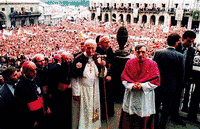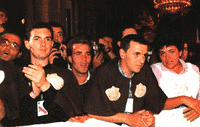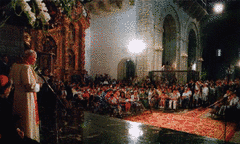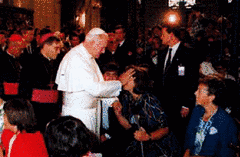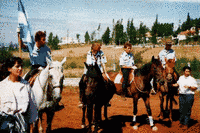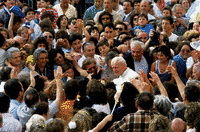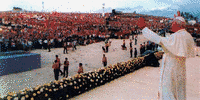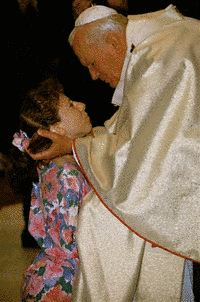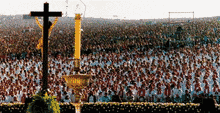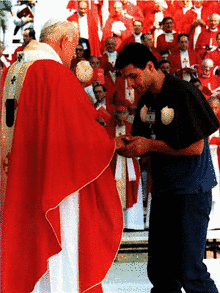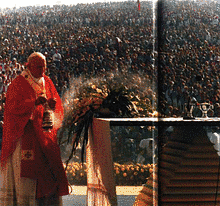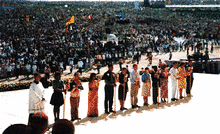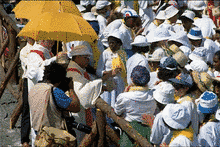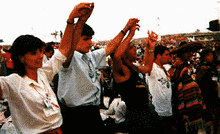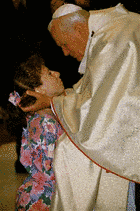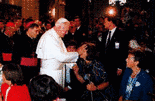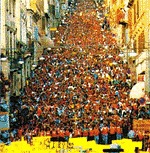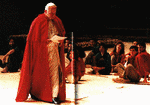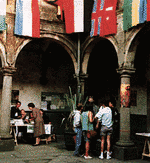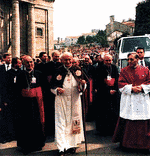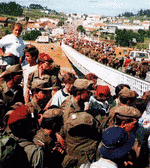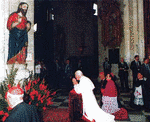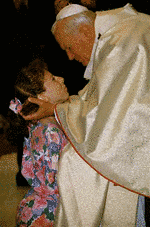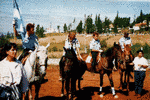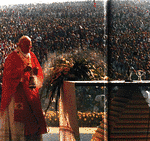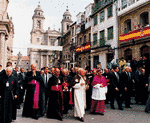World Youth Day Santiago de Compostela 1989

IV JORNADA MUNDIAL DE LA JUVENTUD - in Spain / España
15th - 20th August 1989 (2nd international WYD)
“I am the Way, the Truth and the Life” (Jn 14, 6)
Pope Saint John Paul II's Message: "This offers me the happy opportunity of speaking to young people from all around the world, to say to each and every one you that the Pope looks at you with so much love and so much hope, that he listens to you very attentively аnd wishes to respond to your deepest aspirations..."
After the welcome ceremony in Santiago de Compostela on Saturday 19th August, Papa San Juan Pablo II spoke during the rite of the pilgrim and prayed before the tomb of the Apostle. In the afternoon, JPII met with sick and disabled young people before the World Youth Day Vigil at Monte del Gozo. Here again on Sunday, Pope St John Paul II celebrated Mass for IV World Youth Day, ending with the Angelus before travelling to Covadonga.To read all JPII's words in Spanish, click here.
Discurso del Papa San Juan Pablo II en la Ceremonia de Bienvenida
Aeropuerto Labacolla de Santiago de Compostela, Sábado 19 de agosto de 1989 - also in Italian
"Majestad:
Gracias por sus cordiales expresiones de bienvenida, que reavivan en mi memoria las inolvidables muestras de simpatía recibidas con motivo de mis anteriores visitas pastorales a España. A mi sincero agradecimiento a Vuestras Majestades, por haberse desplazado a Santiago para recibirme, se une espontáneamente mi afectuoso saludo a todos los amadísimos hijos de España, y en particular a los de Galicia y Asturias. Todos ellos están dignamente representados aquí por mis hermanos en el Episcopado, así como par miembros del Gobierno de la Nación y por las Autoridades Autonómicas, a los cuales saludo con gran respeto y estima.
Al iniciar mi tercera visita pastoral a España no puedo silenciar mi gozo, porque vengo a Santiago de Compostela para encontrarme con jóvenes católicos de todo el mundo. Desde los más lejanos lugares, de todos los continentes, se dan cita fraternal junto al venerado sepulcro del Apóstol, para vivir unas jornadas intensas bajo el signo común de la fe cristiana. Muchas y diferentes han sido en estos días las "rutas jacobeas"; pero único ha sido el itinerario espiritual que ha guiado a estos jóvenes, convertidos en peregrinos a Santiago. Con enorme sacrificio y fatiga, con espíritu de penitencia, han confluido hasta aquí, deseosos de corroborar la amistad con Dios y con los hombres, dejándose inundar por la luz y la paz que Compostela sigue irradiando desde siglos.
En este lugar privilegiado, meta de peregrinos y penitentes, halló la joven Europa uno de los factores poderosos de cohesión: la fe cristiana, reavivada sin cesar, que iba a constituir una de sus raíces más firmes y fecundas. Cuando estamos ya casi en los umbrales del año dos mil, viendo a tantos jóvenes que llegan en busca de este horizonte de gracia y de perdón, podemos percatarnos felizmente de cómo la peregrinación de hoy constituye no sólo un obligado homenaje al pasado, sino también un acto de confianza en sus perspectivas de renovada vitalidad para el presente y para el futuro.
En este año se ha conmemorado el XIV centenario del III Concilio de Toledo; una celebración que puede hacer suscitar un eco de admiración y un cúmulo de sugerencias entre los jóvenes venidos a este encuentro de Santiago. El III Concilio toledano, además de ser un hito importante para el logro de la concordia y de la unión en la historia hispana, nos ofrece la clave para comprender la comunión de España con la gran tradición de las Iglesias de Oriente. ¿Cómo no recordar las figuras de los Santos hermanos Leandro e Isidoro? Ambos, santos y transmisores del saber, favorecieron la unión de los pueblos y la superación de las rupturas causadas por la herejía arriana. Con ellos la Iglesia católica se presentaba ante los pueblos como el espacio creador de libertad en que se encontraban contrapuestas las culturas hispano-romana y goda. Así fue posible inaugurar una nueva época e ir más allá de las diferencias y divisiones que ofrecían aspectos no fácilmente reconciliables. Frutos preciados de aquel acontecimiento eclesial fueron la armonización profunda de perspectivas entre la Iglesia y la sociedad, entre fe cristiana y cultura humana, entre inspiración evangélica y servicio al hombre.
España ha tenido siempre una vocación universal, católica. Preclaro símbolo de esa vocación es Santiago de Compostela, la ciudad que, por la fuerza de la memoria apostólica, atrae a distintos pueblos para que encuentren la unidad en una misma fe. El nombre de Santiago corrobora la presencia de España en la historia de las tierras de América. Por esto, al visitar España por segunda vez, encomendé a la Virgen del Pilar en Zaragoza la ya próxima celebración centenaria del descubrimiento y evangelización de América. En más de una ocasión he tenido la oportunidad de reconocer la gesta misionera sin par de España en el Nuevo Mundo. La Iglesia de hoy se prepara a una nueva cristianización, que se presenta a sus ojos como un desafío, al cual deberá responder adecuadamente como en tiempos pasados.
Vengo, pues, a Santiago, ciudad de innumerables referencias para innumerables pueblos. Vengo como Sucesor de Pedro para alentar a mis hermanos; para avivar las fuerzas de los jóvenes y confortarme con ellos; y para anunciar a Jesucristo como Camino, Verdad y Vida. Para comprometer a todos en la construcción de un mundo donde resplandezca la dignidad del hombre, imagen de Dios, y promueva la justicia y la paz. Y siguiendo el testimonio del Apóstol protomártir, Santiago, quiero invitar a los jóvenes a que abran sus corazones al Evangelio de Cristo y sean sus testigos; y si fuera necesario testigos-mártires, a las puertas del tercer milenio.
¡Que Dios nos bendiga siempre!
¡Que el Apóstol Santiago nos acompañe! A María, antes de ir a Covadonga, confío este encuentro con la juventud."
Pope Saint John Paul II's address during the Rite of the Pilgrim
Cathedral of Santiago de Compostela, Saturday 19 August 1989 - also in Italian & Spanish
"1. "I was glad when they said to me, 'Let us go to the house of the Lord!'
Our feet have been standing within your gates, O Jerusalem!" (Ps 121, 1-2).
Beloved Brothers in the Episcopate, Brothers and Sisters in Christ:
Like any other pilgrim, I wish to thank the Lord, from whom all good things come, for my being here in Santiago de Compostela. Before this majestic Portico of Glory, which I contemplate for the second time, I feel truly overcome by that emotion enkindled in the hearts of thousands and thousands of pilgrims to Santiago, who down through the centuries have set their eyes on this singular and original stone altar-piece, evocative image of the heavenly Jerusalem.
Before going through the gates of this House and Basilica of Saint James to venerate his tomb and embrace his statue, I wish to greet those here present, pilgrims also to the tomb of the Apostle.
In the first place I wish to greet fraternally the Pastor of this archdiocese. Archbishop Antonio María Rouco Varela, whom I thank for the touching words he has kindly addressed to me. In the same way I greet his Auxiliary Bishop, Most Rev. Ricardo Blázquez Pérez, also the Cardinals and other bishops present, who have come from other dioceses of Spain and of the world, accompanied by so many pilgrims. As well, I greet the numerous priests and religious.
I also cordially greet the seminarians and young people who, representing all the others and wearing the pilgrim cloak on their shoulders, have accompanied me to the Cathedral.
In a particular way I renew my affectionate greeting to their Majesties, the King and Queen of Spain, who have wished to participate in this liturgy. Through them may I reiterate my warm greeting to the beloved people of Spain.
God willed that as Bishop of Rome, successor of St Peter, a native of oriental Galizia, I might come once again as a pilgrim and be here in this holy place in occidental Galicia, together with young pilgrims from all over the world, to give praise to Jesus Christ, the Way, the Truth and the Life.
2. "Jerusalem, built as a city which is bound firmly together, to which the tribes go up, the tribes of the Lord, as was decreed for Israel, to give thanks to the name of the Lord" (Ps 121, 3-4).
This pilgrimage takes on an exceptional meaning, since it is the objective of all those taking part in the World Youth Day.
In Compostela, spacious home with an open door, the bread of "forgiveness" and grace has been dispensed for centuries upon centuries, without any discrimination whatsoever. From now on it wishes to become a luminous focus of Christian life, a reserve of apostolic energy for new ways of evangelization, through the impulses of the faith of young people, an ever youthful faith.
Many have joined my pilgrimage - many more are also present in spirit - all feeling summoned by the word of Christ: "I am the Way, the Truth and the Life" (Jn 14, 6). These same pilgrims transmit to the world of today the seed of hope in a new generation of Christ's disciples, intimately motivated and generously dedicated like the Apostle Saint James to the adventure of spreading and giving root to the Good News throughout the world. This evangelization presents itself as the prerogative of generous and creative young people, open to the building of a world without frontiers, in which a civilization of love prevails and whose protagonists must be the People of God spread throughout the world.
3. "Pray for the peace of Jerusalem! 'May they prosper who love you! Peace be within your walls'" (Ps 121, 6-7).
Today, here, before the Portico of Glory, this pilgrimage of the fourth World Youth Day is like a clear and eloquent sign for the world. Our voices unanimously proclaim our faith and our hope. We want to enkindle a fire of love and truth which will attract the attention of the world, as the mysterious lights seen here did in the past. We wish to shake off the torpor of our world, with a convinced cry of thousands and thousands of young pilgrims who proclaim Christ as the redeemer of mankind, the centre of history, the hope of nations and saviour of peoples.
With them and with all those here present before this Portico, there comes alive before our eyes the great meeting of the pilgrims before the doors of the Basilica of Santiago, described in the Codex Callistinus: "Countless people of all nations go there... There is no language nor dialect which is not heard there... The doors of the Basilica never close, neither by day nor by night... Everyone goes here exclaiming: "E-ultr-eia (Forward, yes!) E-sus-eia (Up, yes!)". Yes. For a moment Santiago de Compostela is today the meeting tent, the object of pilgrimage, the eloquent sign of the Church, pilgrim and missionary, penitent and wayfarer, praying and evangelizing, which travels all the paths of history "amid the persecutions of the world and the consolations of God, announcing the cross and death of the Lord until he comes" (cf Lumen Gentium, 8).
4. "For brethren and companions' sake I will say, 'Peace be within you!' For the sake of the house of the Lord our God, I will seek your good" (Ps 121, 8-9).
In the first place I have come to proclaim to all of you and strengthen your conviction that the Church is the pilgrim People of God. It was not without reason that the first Christians were called wayfarers (cf Heb 9, 2). The Church in travelling along the paths of history does not cease to affirm constantly the presence of Jesus of Nazareth, since the mysterious Pilgrim of Emmaus is present on the way of every Christian. He continues to accompany his own, illuminating them with his enlightening Word and nourishing them with his Body and Blood, Bread of eternal life.
Furthermore, it is not surprising that the "Way to Santiago" has been sometimes considered as an example of the Church's pilgrimage on its journey towards the heavenly city. It is a path of prayer and penance, of charity and solidarity; a stretch of the path of life where the faith, becoming history among mankind, also converts culture into something Christian. The churches and abbeys, the hospitals and shelters of the Way to Santiago still speak of the Christian adventure of making pilgrimage in which the faith becomes life, history, culture, charity and works of mercy.
Now, almost on the threshold of AD 2000, the Church still wishes to be the travelling companion of humanity; she wishes to accompany us also, at times sorrowful and abandoned as a result of so many infidelities, and always in need of guidance towards salvation amid the dense mist which looms before us, when the awareness of the common Christian vocation is dimmed, even among the very members of the faithful. Allowing themselves to be led by the Spirit, Christians will spread everywhere the values of peace and truth which spring from the Gospel, and which are capable of giving a new meaning and nourishing sap to the world and society of today.
It is necessary then that the memory of a singular Christian past urge all the members of the Church and, I would add in particular the sons and daughters of noble Spain, to dedicate themselves to an exciting task: that of causing a new Christian humanism to flourish, one which will give meaning to life at a time when there is so much hunger and thirst for God.
5. "Know that the Lord is God!... Enter his gates with thanksgiving and his courts with praise! Give thanks to him, bless his name!" (Ps 99, 3-4).
This, then, is the primary reason that has moved me to come to the tomb of the Apostle: to announce from here that Christ is and will continue to be "the Way, the Truth and the Life". In these very evocative words we discover the root of Christ's total revelation to man, to every individual, who must accept him as Way if he does not want to go astray, accept him as Truth if he does not want to fall into error, and open himself to the outpouring of Life - eternal life - which springs from him, if he does not want to let himself be taken in by ideologies and cultures of death and destruction.
Today as yesterday, we need to discover personally, as our Apostle did, that Christ is the Lord, so as to become followers and apostles, witnesses and spreaders of the Gospel, and thus build a more just civilization, a more habitable human society. This is the heritage which St James has left, not just to Spain and Europe, but to all the peoples of the world. This is also the message which the Pope, the Successor of Peter, wants to entrust to you, so that the Good News of salvation is not converted into a sterile silence, but rather that it finds a favourable response and yields abundant fruits of eternal life.
In the portico of this Cathedral, which you quite rightly call the "Portico of Glory" on account of its architectural beauty and its deep spiritual meaning, we can contemplate the image of the Blessed Virgin Mary, which appears in an expressive gesture of acceptance of the divine Will. May she, Pilgrim of faith and Virgin of the Way, help all of us to give, with firmness and submission, a definitive "yes" to the divine plan, so that there may be in the Church and in the world the true renewing strength of grace, and that all may return to walk again as brothers and sisters along the path which leads to the heavenly mansion. From my heart I implore you not to forget that which is your very own, the historical legacy of St James; giving thanks to God for the past, keep on looking towards the future. Ever faithful to your Catholic faith, professed always in communion with the Successor of Peter, with youthful vigour may you always present to the world the lasting evangelic message of the Apostle.
"For the Lord is good: his steadfast love endures for ever, and his faithfulness to all generations" (Ps 99, 5).
May St James and Our Lady intercede for us before the throne of the Almighty! Amen."
Papa San Juan Pablo II's Prayer before the tomb of the Apostle St James
Santiago de Compostela, Saturday 19 August 1989 - in English, Italian & Spanish
"Saint James!
Behold me here, once again, beside your tomb
which I approach today, a pilgrim of all the pathways of the earth,
to honour your memory and implore your protection.
I come from luminous and perennial Rome
to you who became a pilgrim, following the footprints of Christ
and who brought his name and his voice
to this farthest part of the earth.
I come from Peter's side
and, as his successor, I bring to you,
to you who, with him, are a pillar of the Church,
the fraternal embrace that traverses centuries
and the song which resounds firm and apostolic in its catholicity.
With me, St James, there is an immense and youthful flood
which has surged from springs in all the countries of the world.
Here, you have it, united and still in your presence,
anxious to refresh its faith in the vibrant example of your life.
We come to this blessed threshold in eager pilgrimage.
We come immersed in this great throng
which throughout the centuries
has led people to Compostela
where you are pilgrim and host, apostle and patron.
And we come today to you because we are on a common journey.
We are walking towards the end of a millennium
which we want to close with the seal of Christ.
We are going further still, to the beginning of a new millennium
which we want to open in the name of God.
St James,
for this pilgrimage of ours we need
your zeal and courage.
For this reason, to ask them of you, we have come
as far as this "finisterrae" of your apostolic adventures.
Teach us, apostle and friend of Our Lord,
the WAY which leads to him.
Open us, preacher of the lands of Spain,
to the TRUTH your learned from the Master's lips.
Give us, witness of the Gospel,
the strength always to love the LIFE.
Place yourself, patron of pilgrims,
at the head of our Christian youthful pilgrimage.
And just as, in the past, the peoples walked towards you,
may you be a pilgrim with us when we go to meet all peoples.
With you, St James, Apostle and Pilgrim,
we want to teach the nations of Europe and the world
that Christ is - today and always -
the WAY, the TRUTH and the LIFE."
Papa St John Paul II's words to the Sick & Disabled Young Pilgrims
Church of the Major Seminary, 19 August 1989 - also in Italian & Spanish
"Dear Brothers and Sisters,
1. On this significant day on which so many young men and women of the entire world, gathered together in Santiago de Compostela or in the most remote parts of the earth, join with the Pope to celebrate Christ the Redeemer, you constitute the centre of attention of the Church, because suffering renders you especially close to Christ; furthermore, it makes you a living Christ in the midst of the world, since "suffering man is the way of the Church because he is firstly the way of Christ himself, the good samaritan who 'did not pass by' but who 'had compassion and went to him and bound up his wounds... and took care of him' (Lk 10, 32-34)" (Christifideles Laici, 53).
For this reason I feel a particular pastoral satisfaction in coming here to greet you - I would like to greet each one of you personally - to speak about your situation, to encourage you, bless you and to let all other men and women see what you are and what you mean for the whole of humanity.
I appreciate the expressive way in which your representative has pointed out your desires and indeed your acceptance of God's will; expressions and testimonies which are summarized in the book which you have just given me.
I would also like to show my appreciation for the sentiments of closeness and solidarity with those who are sick or disabled expressed by a young person of your own age.
In your sickness not only are you privileged in the sight of God but, by means of it, it is you who can ask and help the youth of the world to find Jesus Christ, the Way, the Truth and the Life. At a time when the Cross is hidden away, your acceptance of it makes you witnesses of the fact that Jesus Christ wanted to embrace it for our salvation.
2. Young sick and disabled people! Precisely in the most beautiful period of life, characterized in man by a particular vigour and dynamism, you find yourselves weak and without the strength necessary to carry out so many activities which the other boys and girls of your own age can do.
In fact many people of your age have come on foot today to Monte del Gozo — the Mount of Joy — where we will meet this evening. You are not in a position to walk, but — we could say it with a paradox — you have arrived before anyone at the "mount of joy". Yes, because Calvary, where Jesus died and rose again and where you are with him, is, looked at with the eyes of faith, the mount of joy, the hill of perfect happiness, the summit of hope.
Because I have personally experienced it, I also know the suffering which physical incapacity causes, the weakness that comes with sickness, the lack of energy for work, the feeling of being unable to lead a normal life. However, I also know — and I wish that you also may see it — that this suffering has another sublime characteristic: it gives a great spiritual capacity, because suffering is a purification both for oneself and for others. If it is lived with a Christian outlook it can become a gift offered so as to complete in one's own flesh "what is lacking in Christ's afflictions for the sake of his body, that is the Church" (Col 1, 24).
Thus suffering makes sanctity possible, since it offers great apostolic opportunities and it has an exceptional salvific value when it is united with the sufferings of Christ.
The evangelizing strength which suffering has cannot be measured. So, when I call all the Christian faithful to the great missionary task of carrying out a new evangelization, I have in mind that in the front line will be, as exceptional spreaders of the Gospel, the sick, young sick people. "The sick are sent as labourers into the Lord's vineyard". This is because "the weight that wearies the body's members and dissipates the soul's serenity is far from dispensing a person from working in the vineyard. Instead the sick are called to live their human and Christian vocation and to participate in the growth of the Kingdom of God in a new and even more valuable manner" (Christifideles Laici, 53).
4. In the apostolic letter Salvifici Doloris, I have spoken at length of the Christian meaning of suffering and I have referred to some of the ideas already expressed. I would like this letter to be a guide for your life, so that you would always contemplate your situation in the light of the Gospel, fixing your gaze on Christ crucified, who is Lord of life, Lord of our health and our sicknesses and Master of our destinies.
In offering to Our Lord your limited strength, you are the treasure of the Church, the energy reserve for its task of evangelization. You are the expression of an ineffable wisdom, which can only be learned through suffering. "It is good for me that I was afflicted, that I might learn your statutes" (Ps 118, 71). Through suffering life becomes deeper, more understanding, more humble, more sincere, more united, more generous. In sickness we better understand that our existence is gratuitous and that health is an immense gift of God.
My beloved friends in suffering, through pain you will discover more easily, and you will teach other people to discover Jesus Christ "Way, Truth and Life". Look at Our Lord, the Man of Sorrows. Centre your attention on Jesus who, young like you, by his death on the Cross, helped man see the inestimable value of life, which necessarily brings with it the acceptance of the will of God the Father.
5. Before ending this meeting, I wish now to address all those people who, through family ties of their professional work in the area of health or human and social care, are in continuous contact with our beloved young sick people.
I appreciate the generosity and at times abnegation with which you try to create a welcoming, peaceful family environment around these people who are living images of the suffering Christ. You feel the obligation to carry out your work as a true service, of brother to brother. You know well that a sick person does not only seek relief in his suffering or limitations, but also the help of a brother or sister, who is capable of understanding his state of soul and of helping him to accept himself as he is and to better himself in his daily life.
For this faith is fundamental, a faith which permits you to see in the sick person the friendly face of Christ. Did he not say: "I was sick and you visited me" (Mt 25, 36)? In this Christian framework your service, at times long and tiresome, has an inestimable value before society and, above all, before the Lord.
I bless you, beloved sick and disabled people, with my greatest affection. This blessing I joyfully extend to your loved ones, and to all those who look after you and accompany you in the spiritual, human and health fields."
St John Paul II's words to the Young People at the Vigil at Monte del Gozo
Saturday 19th August 1989 - also in Italian & Spanish
Pilgrims, what do you seek?
1.1. Beloved young people, I greet you in the name of Our Lord Jesus Christ: "the Way, the Truth and the Life". I thank you, who have come from all the cities of Spain and from different Latin American nations, as well as from so many countries throughout the world, for having accepted my invitation to make this pilgrimage together, this journey to the tomb of the Apostle James.
I now greet all the young people of Galicia, especially those from the Archdiocese of Santiago. You have the opportunity to offer shelter and hospitality to the pilgrims who come to your land, a land privileged to contain the goal of a journey which leads to happiness, to joy, to Christ.
At this point I wish to offer greetings in some of the languages represented here by the young pilgrims:
I greet you all, young Italian-speaking people. I hope that the pilgrimage serves to strengthen your journey of faith, and deepen your joy in following Christ in all the ways of your life.
I warmly greet the French-speaking young people, and I thank them for responding in such large numbers to my invitation. Dear young people, you are welcome to this extraordinary meeting which I have greatly desired. May Christ's joy and peace be with you always.
My cordial greeting goes also to the many English-speaking pilgrims who are with us on this happy occasion. Dear young people, you have come to Santiago de Compostela, following in the footsteps of Christian pilgrims from many different times and places. Here, at the tomb of the Apostle James, may you be renewed in the Catholic faith, which comes to us from the apostles. In union with the entire Church, may you commit yourselves generously to follow Jesus Christ, who alone is "the Way, the Truth, and the Life".
My warm greetings go also to the young people from German-speaking lands. In the Gospel, Jesus invites you to follow his word and example. See the word of Jesus not as an unreasonable demand but rather as an encouragement to human and Christian maturity. Have the courage of self-giving in service. You will thus discover your authentic "being", which does not depend on "having", and you will be much the richer.
You also are welcome, young Portuguese-speaking people, who are widely represented here by the boys and girls from the neighbouring nation, Portugal. The Pope has already heard your longings! With deep affinity and affection I repeat a question already asked some time ago at Lisbon: are you aware of being "Christ's natural allies" in evangelization? May you bring from this meeting an even more lively and effective awareness that you are witnesses to Christ, our life, peace, and joy.
I cordially greet you, young Poles who have come from Poland and from Polish communities abroad to Santiago de Compostela for World Youth Day 1989, following the most ancient pilgrim route. It gives me deep joy that, in this place associated with the Apostle and Martyr St James, you wish to pray together with the Pope, and be confirmed in your vocation whose model is Christ himself, our Way, Truth, and Life.
I warmly greet the Flemish and Dutch young people. Through this pilgrimage to Santiago de Compostela, may you understand better that your life is an uninterrupted pilgrimage to your heavenly homeland, and that Jesus Christ is the Way to travel this journey.
I cordially greet all the Croatian young people. May Christ always be the Way, the Truth and the Life for you, your age group, and all your people.
I also warmly greet the young people from Slovenia. May Christ be for you and all your contemporaries the Way, the Truth and the Life. May my Apostolic Blessing accompany you everywhere.
Praised be Jesus Christ! I wish to greet all the young Japanese who have come from the Far East to participate in the World Youth Day, in this meeting of youthful hopes. My wish for you is that, united to Christ, with the Blessed Virgin's help, together with all young people everywhere, you may be able to build a new world. Praised be Jesus Christ!
I greet all the boys and girls from Vietnam. To all of you who have come from so far away, I wish that, having understood the laity's mission in the Church, you may bear witness to it in the world in the name of Jesus; he is the Way, the Truth and the Life.
As well as you, who have gathered together here in great numbers, I have also countless young men and women from all over the world very much present in my mind, because they have united themselves spiritually to us, and have communicated their nearness and participation in this Day.
I also thank the Cardinals and bishops, priests, religious, and all the lay faithful who have accompanied you on this path of St James.
The way. This is the word that best expresses the character of this World Meeting of Young People.
You have set out from all the countries of Europe, from every continent. Some of you have come on foot, like the pilgrims of old; others by bicycle, by boat, by bus, by plane... You have come so as to discover here in Santiago the roots of our faith, to pledge yourselves generously to the "new evangelization", on the very eve of the third millennium.
Over the centuries, countless pilgrims have preceded us on the way to Santiago. At the beginning of the first act of this dramatic representation we have seen the pilgrims with the characteristic and traditional symbols of the "Jacobean Route": the hat, the staff, the shell and the gourd. When you return to your countries, to your homes and places of study, these symbols will help you recall tonight's meeting and above all its significance.
For us, just as it did for those pilgrims who have preceded us in ages past, this way expresses a deep spirit of conversion. A desire to return to God. A way of purification and penance, of renewal and reconciliation.
Thus, for each one of us, as it did for the pilgrims who have gone before us, it is very important that it end with a meeting with the Lord, through the Sacraments of Penance and the Eucharist. I know that many of you have received these sacraments during these past days. "Purification of heart and a conversion to the heavenly Father are — as the bishops of the dioceses of the "Jacobean Route" have written in their pastoral letter — the fundamental inspiration and objective of the Way to Santiago" (n 57).
1.2. Let us reflect now on the meaning of the word "way", so that this conversion of heart and meeting with the Lord, which we are living, may give meaning to our lives.
The word "way" is very closely related to the idea of "search". This aspect has been highlighted in the representation which we are seeing.
What do you seek, pilgrims? the crossroads have asked. This crossroads represents the question which man puts to himself regarding the meaning of life, regarding the goal he wants to reach, regarding the reason for his behaviour.
We have seen represented, in a very expressive manner, some of the things which frequently many people set up as the goal of their lives and activity: money, success, egoism, comfort. However the young pilgrims in the play have seen that in the long term these do not satisfy man. These things are unable to fill the human heart.
1.3 What do you seek, pilgrims? Each one of us here must ask himself this question. But you above all, dear young people, since you have your life ahead of you. I invite you to decide definitively the direction of your way.
With the very words of Christ, I ask you: "What do you seek"? (Jn 1, 38). Do you seek God?
The spiritual tradition of Christianity not only underlines the importance of our search for God. It highlights something more important still: it is God who seeks us. He comes out to meet us.
Our way to Compostela means wanting to give an answer to our needs, to our questions, to our "search"; it also means going out to meet God who looks for us with a love so great that we have difficulty understanding it.
1.4. This meeting with God is realised in Jesus Christ. In Him, who has given his life for us, in his humanity, we experience the love which God has for us. "For God so loved the world that he gave his only Son, that whoever believes in him should not perish but have eternal life" (Jn 3, 16).
Just as Jesus called St James and the other apostles he also calls each one of us. Each one of us, here in Santiago, has to understand and believe: "God is calling me, God is sending me." From all eternity God has thought about us and has loved us as unique and unrepeatable persons. He calls us and his call comes to us through the person of Jesus Christ who says to us, as he said to the apostles: "Come, follow me." He is the Way which leads to the Father!
Yet we must recognize that we have neither sufficient strength, nor constancy, nor purity of heart to follow God with our whole life and with our whole heart. Let us ask Mary, she who was the first to follow the path of her Son, to intercede for us.
Jesus wants to accompany us, as he accompanied the disciples on the way to Emmaus. He points out to us the direction of the path to follow. He gives us the strength. On returning home, like the disciples of the Gospel story, we will be able to say that our hearts burned within us when he spoke to us on the way and that we recognized him in the breaking of the bread (cf Lk 24, 32, 35). That will be the moment to present ourselves to our brothers, above all to other young people, as witnesses. Yes! Witnesses of the love of God and of their hope of salvation.
Where is the Truth?
2.1. "We are seeking the truth." The words of the last song must resound in our hearts. It is the deepest meaning of the camino of Santiago: to seek the truth and proclaim it.
Where is truth? "What is truth?" (Jn 18, 38). Before you there was a man who asked Jesus this same question.
In the play we saw three of the answers that the world gives to these questions. The first is to put all our longing into the full and immediate gratification of one's senses, a continual search for the pleasures of life. To this, the pilgrims replied: "We had fun, but... we continue to be empty".
The second answer, that of the violent who put all their interest in having power and dominion over others, was not accepted by pilgrims of the second scene either. This response not only leads to the destruction of the dignity of the other — brother or sister — but also one's own destruction. Certain experiences of this century, which are still going on today, demonstrate clearly what happens to those whose goal is power and domination.
The third response, represented by drug addicts, seeks liberation and self-realization through the evasion of reality. It is the sad experience of so many people, amongst them many young people of your ages, who follow this path or other similar ones, and instead of taking them to freedom, these roads make them slaves and lead to self-destruction.
2.2. I am sure that you, like almost all young people of today, are worried about air and sea pollution, that is to say, the problem of the ecology. You are shocked by the misuse made of the earth's resources and the growing destruction of the environment. And you are right. We must act in a coordinated and responsible way to change this situation before our planet suffers irreversible damage.
But, dear young people, there is as well a pollution of ideas and morals which can lead to the destruction of man. This pollution is sin, from which is born the lie.
The truth and the lie. We must recognise that many times the lie is presented to us as truth. Therefore it is necessary to discern so as to recognise the truth, the Word that comes from God, and reject the temptations that come from the "father of lies". I mean sin, which is the negation of God, the rejection of the light. As the Gospel of John states, "the true light" was in the world "and the world was made through him, yet the world knew him not" (cf Jn 1, 9, 10).
The tragedy of Pilate
2.3. "At the root of human sin is the lie which is a radical rejection of the truth contained in the Word of the Father, through whom is expressed the loving omnipotence of the Creator: the omnipotence and also the love of God the Father, creator of heaven and earth' " (Dominum et Vivificantem, n 33).
"The truth contained in the Word of the Father". This is what we mean when we recognise Jesus Christ as the Truth. "What is truth?" he was questioned by Pilate. Pilate's tragedy was that the Truth was in front of him, in the person of Jesus Christ, and he was not able to recognize it.
Dear young people: this tragedy must not happen in our lives. Christ is the centre of Christian faith; a faith that the Church proclaims today, as she has always done, to all men and women: God became man. "And the Word became flesh, and dwelt among us" (Jn 1, 14). The eyes of faith see in Jesus Christ that which man can be and as God wishes him to be. At the same time, Jesus reveals to us the love of the Father.
2.4. As I wrote in the Message for this World Youth Day, truth is the deepest demand (exigency) of the human spirit. Above all, you must have a thirst for the truth about God, about man, about life and the world.
But the Truth is Jesus Christ. Love the Truth! Live the Truth! Bring the Truth to the world! Be witnesses to the Truth! Jesus is the Truth that saves; he is the complete Truth to which the Spirit of Truth shall lead us (cf Jn 16, 13).
Dear young people: let us search the truth about Christ, about his Church. However, let us be consistent: let us love the truth, live in the truth, proclaim the truth! O Christ, teach us the Truth. Be for us the only Truth!
What is the meaning of life?
3.1. Finally, dearest young people, Christ is the Life. I am sure that each of you loves life, not death. You wish to live life to the full, animated by hope, which is born from a project of broad perspectives.
It is right that you have a thirst for life, for a full life. You are young precisely for this. However, in what does life consist? What is the meaning of life and what is the best way of realizing it? A short time ago you sang with enthusiasm: "We are pilgrims of life, walkers united through love". Is this not the basis for the answer that you seek?
The Christian faith places a profound link between love and life. In the Gospel of John we read: "God so loved the world that he gave his only Son, that whoever believes in him should not perish but have eternal life" (Jn 3, 16). God's love leads us to life, and this love and this life are realized in Jesus Christ. He is the Incarnate Love of the Father; in Him "is manifested the goodness of God our Saviour and his love appeared" (Tit 3, 4).
Dearest young people, Christ is therefore the only competent interlocutor to whom you can put the essential questions about the value and meaning of life: not only a healthy and happy life, but also life filled with suffering, when it is marked by some physical disability or by difficult family and social situations. Yes, Christ is the only competent interlocutor, also for the dramatic questions, which can be formulated more with groans than words. Ask him, listen to him!
The meaning of life, He will say to you, is in love. Only the person who knows to love all the way to forgetting himself so as to give himself to his brother fully realises his own life and expresses to the highest degree the value of his earthly existence. It is the evangelic paradox of the life which is redeemed by being lost (cf Jn 12, 25), a paradox which finds its full explanation in the mystery of Christ who died and rose for us.
3.2. Dear young people, the mature perspective of a human and Christian vocation is presented to us as part of the gift. This is important above all in the case of a religious vocation, by which a man or a woman, through the profession of the evangelical counsels, takes on for the sake of the Kingdom of God the programme which Christ himself carried out on earth. Religious commit themselves to give a particular witness, placing the love of God above all other things, and remind everyone of the common call to union with God in eternity.
The world of today needs these witnesses now as never before, because very frequently it is so occupied with the things of this earth that it forgets those of heaven.
I want to recall here in a special way 400 young contemplative nuns from Spain, who have indicated to me their wish to be present at this Meeting. I am certain that they are very united to all of us through their prayer in the silence of the cloister. Seven years ago, many of them attended the meeting which I had with young people in the Santiago Bernabeu Stadium in Madrid. Afterwards, responding generously to the call of Christ, they have followed him for life. Now they dedicate themselves to praying for the Church, but above all for you, young men and women, that you also may be able to respond with generosity to the call of Jesus.
With deep joy I also present to you, as a model of following Christ, the praiseworthy figure of the Servant of God Rafael Arnáis Barón, a Trappist Oblate who died at 27 years of age, in the Abbey of San Isidro de Dueñas (Palencia). It has been justly said of him that he lived and died "with a cheerful heart and with great love of God". He was a young person, like many of you, who welcomed the call of Christ and followed it with determination.
3.3. However, young people who are listening to me, Christ's call is not addressed only to the Brothers, Sisters and priests. He calls everyone; he also calls those who, upheld by love, want to get married. It is God, in fact, who created the human being male and female, thus introducing into history that singular duality thanks to which man and woman, although essentially having equal rights, have the characteristic of that wonderful complementary of attributes, which brings about mutual attraction. The love which blossoms when masculinity and femininity meet embodies the call of God himself, who created man "in his image and likeness", precisely as "man and woman". Christ has made this call his own, and enriched it with new values in the definitive Covenant established on the Cross. So, my dear friends, in the love of every baptized person, he asks to be able to express his love for the Church, for which he sacrificed himself so "that he might present the Church to himself in splendour, without spot or wrinkle or any such thing, that she might be holy and without blemish" (Eph 5, 27).
Dear young people! to each one of you, as to that youth of your age referred to in the Gospel (cf Mt 19, 16-22), Christ renews the call "Follow me!" Sometimes these words mean: "Follow me as I am the Spouse of the Church. Participate in the mystery, in that sacrament which the Letter to the Ephesians describes as "great": great in fact "in reference to Christ and the Church" (Eph 5, 32).
Young people who are listening to me. Christ wishes to teach you the wonderful wealth of nuptial love. Let him speak to your hearts. Do not run away from him. He has something important to tell you for the future of your love. Above all with the grace of the sacrament, he has something decisive to give you, so that your love will have the necessary strength to overcome the trials of life.
Today, many voices around you speak a language different from that of Christ, proposing models of behaviour which, in the name of a "modernity" freed from "complexes" and "taboos" — as it is the custom to say — reduce love to a fleeting experience of personal satisfaction or even of mere sexual enjoyment. To those who are able to look at this type of relationship without prejudice, it is not difficult to distinguish behind the loud words the disappointing reality of egoistic behaviour, which aims principally at a personal advantage. The other is no longer accepted as a subject with her own dignity, but is degraded to the level of an object, disposed of not according to the criteria of values but of interests.
Even the child, who should be the living fruit of the love of his parents, which incarnates, in a way transcends, and perpetuates itself in him, ends up by being considered a thing which one has the right to accept or reject according to one's state of mind.
How can one fail to notice the woodworm of a consumer mentality that has slowly emptied love of its exceptional content, in which is manifested the spark of the fire which burns in the heart of the Holy Trinity. One must bring love back to its eternal source if one wants it to give real gratification, joy, life.
To you young people falls the duty of being witnesses in the world of today to the truth of love. It is a demanding reality which often contrasts with current opinions and "slogans". But it is the only truth worthy of human beings called to form part of the family of God!
What does Jesus want of me?
4.1. You have come to this Monte del Gozo (Mount of Joy), full of hopeful anticipation and confidence, setting aside the snares of the world, truly to meet Jesus, "the Way, the Truth and the Life", who has invited each one of you to follow him lovingly. This is a universal call, which does not take the colour of one's skin into account, nor one's social condition or age. On this night, so moving for its religious significance, fraternity and youthful joy, Christ, as Friend, is in the midst of the assembly to ask you personally if you want to follow decidedly the way which he is showing you, if you are prepared to accept his truth, his message of salvation, if you want to live the Christian ideal fully.
It is a decision which you must take without fear. God will help you; he will give you his light and his strength so that you may respond generously to his call, a call to a total Christian life.
Respond to the call of Jesus Christ and follow him!
4.2. But, more than one of you is asking him or herself: What does Jesus want of me? To what is he calling me? What is the meaning of his call for me?
For the great majority of you, human love will present itself as a way of self-realization in the formation of a family. This is why, in the name of Christ I want to ask you:
Are you prepared to follow the call of Christ through the Sacrament of Marriage, so as to be procreators of new life, people who will form new pilgrims to the heavenly city?
In the history of salvation, Christian marriage is a mystery of faith. The family is a mystery of love, because it collaborates directly in the creative work of God. Beloved young people, a large sector of society does not accept Christ's teachings and, consequently, it takes other roads: hedonism, divorce, abortion, birth control and contraceptive methods. These ways of understanding life are in clear contrast to the Law of God and the teachings of the Church. To follow Christ faithfully means putting the Gospel message into practice, and this also implies chastity, the defence of life and also the indissolubility of the matrimonial bond, which is not a mere contract which can be arbitrarily broken.
Living in the "permissiveness" of the modern world, which denies or minimizes the authenticity of Christian principles, it is easy and attractive to breathe in this contaminated mentality and give in to the passing desire. But bear in mind that those who act in this way neither follow Christ nor love him. To love means to walk together in the same direction towards God, who is the Source of Love. In this Christian framework, love is stronger than death because it prepares us to welcome life, to protect it and defend it from the mother's womb until death. Therefore I ask you again:
Are you prepared to protect human life with the maximum care at every moment, even in the most difficult ones? Are you prepared, as young Christians, to live and defend love through indissoluble marriage, to protect the stability of the family, a stability which favours the balanced upbringing of children, under the protection of a paternal and maternal love, which complement each another?
This is the Christian witness that is expected of the majority of you, young men and women. To be a Christian means to be a witness to Christian truth and today, particularly, it is to put into practice the authentic meaning which Christ and the Church give to life and to the full realization of young men and women through marriage and the family.
4.3. Yes, my dear young people, Christ is not only calling you to walk with him on this pilgrimage of life. He is sending you out in his place to be messengers of truth, to be his witnesses in the world and, in practice, before other young people like yourselves, because today, all over the world, many of them are in search of the way, the truth and the life, but they do not know where to find them.
"The hour has come for a re-evangelization" (Christifideles Laici, 34), and you cannot be found wanting in this urgent call. In this place dedicated to St James, the first of the apostles to give testimony to his faith through martyrdom, let us pledge ourselves to accept the command of Christ: "you shall be my witnesses... and to the end of the earth" (Acts 1, 8).
What does it mean to give witness to Christ? It simply means to live in accordance with the Gospel: "You shall love the Lord your God with all your heart, with all your soul, and with all your mind... You shall love your neighbour as yourself" (Mt 22, 37,39).
The Christian is called to serve his neighbour and society, to promote and support the dignity of every human being, to respect, defend and favour the right of the person, to be a builder of a lasting and authentic peace based on fraternity, freedom, justice and truth.
Despite the marvellous possibilities which modern technology offers man, there is still a great deal of poverty and misery in the world. In many parts of the world people live menaced by violence, by terrorism and even by war. Our thoughts turn, once again, towards Lebanon and the other countries of the Middle East, and also to all peoples and nations where there is war and violence.
It is urgently necessary to be able to count on envoys of Christ, on Christian messengers. And you, young people, young men and young women, in the future you will be these envoys or messengers.
4.4. Christ's call leads along a way which is not easy to travel, because it can also lead us to the Cross. But there is no other way which leads to truth and which can give life. Nevertheless, we are not alone on this path. Mary, through her Fiat, opened a new way for humanity. By her acceptance of and total dedication to the mission of her Son, she is the prototype of every Christian vocation. She will walk with us, she will be our travelling companion, and with her help we will be capable of following the vocation which Christ offers us.
Dear young people, let us set out upon our way with Mary; let us commit ourselves to following Christ, the Way, Truth and Life. Thus we will be zealous bearers of the message of the new evangelization and generous builders of the civilization of love."
Pope Saint John Paul II's homily at
Holy Mass for IV World Youth Day
Monte del Gozo, Sunday 20th August 1989 - also in Italian & Spanish
"1. "Peoples shall yet come, even the inhabitants of many cities; the inhabitants of one city shall go to another, saying, 'Let us go at once to entreat the favour of the Lord, and to seek the Lord of hosts"' (Zech 8: 20-21).
I cordially greet all those present!
Inhabitants of numerous cities! Representatives of many peoples and nations! You have come here not just from Galicia, from the whole of Spain, from all over Europe, from the Atlantic to the Urals, but also from North America and Latin America, the Middle East, from Africa, Asia and Oceania.
It is likewise a pleasure for me to greet the young people who have come from so many parish and diocesan communities, and from associations, movements and groups of the Church of God.
I greet the young people present at this Eucharistic Celebration and your contemporaries, wherever they may be.
I have invited you on this pilgrimage on the occasion of the World Youth Day of the Year of Our Lord 1989. I thank you wholeheartedly for your presence here.
2. This place is united to the memory of the Apostle of Jesus Christ. One of the two sons of Zebedee: James, brother of John. Through the Gospel we know his father's name and we also know his mother. We know that she intervened before Jesus on behalf of her sons: "Command that these two sons of mine may sit, one at your right hand and one at your left, in your kingdom" (Mt 20, 21).
The mother was anxious to assure the future of her sons. She observed all that Jesus did; she had seen the divine power that accompanied his mission. She certainly believed that he was the Messiah announced by the prophets, the Messiah who was going to restore the kingdom of Israel (cf Acts 1, 6).
We should not be surprised at the attitude of this mother. We should not be surprised at a daughter of Israel who loved her people. And she loved her sons. She wanted for them what she considered a good thing.
3. Look at James, son of Zebedee, a fisherman like his father and brother; the son of a determined mother.
James followed Jesus of Nazareth. When, in reply to their mother's question the Master asked, "Are you able to drink the cup that I am to drink?", (Mt 20, 22), James and his brother John answered without a doubt: "We are able" (Mt 20, 22).
This is not a calculated reply, but rather one which is full of confidence.
James did not yet know and, in any case, if he knew something he did not fully know what this "cup" meant. Christ was speaking of the cup which he himself had to drink, the cup which he had received from the Father.
The moment came when Christ fulfilled what he had earlier announced: he drank the cup which his Father had given him to the last drop.
The truth is that James was not with his Master on Golgotha. Neither were Peter nor the other Apostles. Only John remained with Christ's Mother, he alone.
Nevertheless, later all of them understood - and James understood - the truth about the "cup". He understood that Christ had to drink it to the last drop. He understood that it was necessary for him to undergo all that; that he had to suffer death on a cross...
Christ, in effect, the Son of God, "came not to be served but to serve and to serve, and to give his life as a ransom for many" (Mt 20 28).
Christ is the servant of human Redemption!
Thus: "whoever would be great among you must be your servant" (Mt 20, 26).
4. Down through the centuries people from many cities and nations have come on pilgrimage here; to the Apostle to whom Christ said: "you will drink my cup".
Young people have come in pilgrimage to the tomb of the Apostle to learn that Gospel truth: "whoever would be great among you must be your servant".
In these words we find the essential criterion of human greatness. This criterion is new. It was new in the time of Christ and continues to be so 2000 years later.
This criterion is new. It implies a transformation, a renewal of the criteria by which the world is governed. "You know that the rulers of the Gentiles lord it over them, and their great men exercise authority over them. It shall not be so among you" (Mt 20, 25-26).
The criterion by which the world is governed is the criterion of success. To have power... To have economic power, so as to make the dependence of others be seen. To have cultural power in order to manipulate consciences. To use... аnd to abuse!
Such is the "spirit of this world".
Does this mean perhaps that power in itself is evil? Does this mean that the economy - economic initiative - is in itself bad?
No! By no means. Both of them can also be a way of serving. This is the spirit of Christ, the truth of the Gospel. This truth and this spirit are expressed in the Cathedral of Santiago de Compostela through the Apostle, who — according to his mother's wish — would be the first; however — following Christ — he became a servant.
5. Why are you here, you young people of the '90s and of the 20th century? Do you feel perhaps within yourselves "the spirit of this world", in so far as this era, rich in means of use and abuse, struggles against the spirit of the Gospel?
Have you not perhaps come here to convince yourselves once and for all that to be great means to serve? However... are you prepared to drink of this cup? Are you prepared to let yourselves be permeated by the body and blood of Christ; so as to die to the old man which is in us and rise again with him? Do you feel the Lord's strength which can enable you to bear your sacrifices, sufferings and the "crosses" which weigh upon the young people who are disoriented as regards the meaning of life, manipulated by power, unemployed, hungry, submerged in drugs and violence, slaves of the eroticism which is spreading everywhere...? Know that Christ's yoke is easy... and that only in him will we find the hundredfold here and now, and eternal life later.
6. Why are you here, you young people of the '90s and of the 20th century? Do you feel perchance within yourselves "the spirit of this world"?
Have you not perhaps come here — I ask you again — to convince yourselves once and for all that to be great means to serve? This service is certainly not mere humanitarian sentimentality. Nor is the community of the disciples of Christ a volunteer agency or social help group. Such a concept of service would imply stooping to the level of the "spirit of this world". No! Here we are dealing with something more. The radicality, quality and destiny of this "service" to which we have all been called must be seen in the context of the human Redemption. Because we have been created, we have been called, we have been destined, first and foremost, to serve God, in the image and likeness of Christ who, as Lord of all creation, as centre of the cosmos and of history, showed his royal power through obedience unto death, and was glorified in the Resurrection (cf Lumen Gentium, 36). The kingdom of God is realized by means of this "service", which is the fullness and measure of all human service. It does not act according to human criterion through power, might and money. Each one of us is asked for a total readiness to follow Christ, who "came not to be served, but to serve".
I invite you, dear friends, to discover your true vocation to cooperate in the spreading of this Kingdom of truth and life, of holiness and grace, of justice, love and peace. If you really wish to serve your brothers and sisters, let Christ reign in your hearts, let him help you to discern and grow in dominion over yourselves, to strengthen you in the virtues, to fill you above all with his charity, to guide you along the path which leads to the "condition of the perfect one". Do not be afraid to be saints! This is the liberty with which Christ has set us free (cf Gal 5, 1). Not as the powers of this world promise it, with false hope and deceit: total autonomy, a breaking of every dependency as creatures and sons and daughters, an affirmation of self-sufficiency which leaves us defenceless before our limitations and weaknesses, alone in the prison of our egoism, slaves to the "spirit of this world", condemned to the "bondage of decay" (Rom 8, 21).
For this reason, I ask the Lord to help you to grow in this "true freedom", as a basic and illuminating criterion of judgement and choice in life. This same freedom will direct your moral behaviour in truth and charity. It will help you to discover authentic love, uncorrupted by an alienating and harmful permissiveness. It will make you people who are open to a possible total self-giving in the priesthood or consecrated life. It will make you grow in humanness through study and work. It will inspire your works of solidarity and your acts of service to those in need, whether in body or in soul. It will enable you to become "masters", so as to serve better, and not "slaves", victims and followers of the dominant trends in attitudes and ways of behaviour.
7. To serve: to be a person for others.
This is also a truth which the Apostle Paul teaches very eloquently, in the second Reading of today's liturgy.
"I bid every one among you not to think of himself more highly than he ought to think, but to think with sober judgement, each according to the measure of faith which God has assigned to him" (Rom 12, 3).
And the Apostle adds: "Having gifts that differ" (Rom 12, 6).
Yes! You need to know well the gifts God has granted you in Christ. It is necessary to know well the gift you have received, in order to give it to others, to contribute to the common good.
Yes. You need to perceive well the gifts God has granted you in Christ. You need to know well the gift you have received in the very experience of family and parish life, in working together with others in associations, and in the charismatic flourishing of movements, so as to be able to give it to others: thus to enrich the communion and missionary thrust of the Church, to be witnesses of Christ in your neighbourhood and school, in the university and factory, in places of work and recreation..., to contribute to the common good, as servants of experiences of growth in humanity, of dignity and solidarity, in which young people may be authentic protagonists of more human ways of life.
8. This is what the Apostle teaches. What he says is not just a mere teaching, but a fervent call.
"Let love be genuine; hate what is evil, hold fast to what is good; love one another with brotherly affection; outdo one another in showing honour. Never flag in zeal, be aglow with the Spirit, serve the Lord. Rejoice in your hope, be patient in tribulation, be constant in prayer. Contribute to the needs of the saints, practise hospitality" (Rom 12, 9-13).
Is he not perhaps saying this particularly to you, to young people? Does the fact that you are young not imply a particular sensitivity to this plan of life and action, to this world of values?
Does it not open towards this world? And if, by chance, it feels the resistance which comes from within, or indeed from without, does not your being young dispose you to struggle precisely for just such a "form" of life?
This form has been given to human life by Christ. He knows what is within man (cf Jn 2, 25).
"Christ the new Adam, in the very revelation of the mystery of the Father and of his love, fully reveals man to himself and brings to light his most high calling" (Gaudium et Spes, 22).
Dear young people, let yourselves be won by him! Christ alone is the way, the truth and the life as, in the remarkable Gospel synthesis, the theme of our World Youth Day proclaims.
O Mountain of Joy, to which pilgrims have come, you remind us of one of the most beautiful characteristics of Santiago and its roads: universality.
I invite all those who travel it to maintain, as you have always done, the bonds of catholicity.
9. You have come here on pilgrimage to the tomb of the Apostle who can confirm at first hand, if we can put it like that, the truth of the vocation of man, whose reference point is Christ.
You have come to find your personal vocation.
You draw close to the altar to offer, with the bread and wine, your youth, your search for truth, and everything which is good and beautiful in you.
All that creative restlessness.
All the sufferings of your young hearts.
10. Being here among you, I wish to say with the Psalmist: Behold "the earth has yielded its harvest" (Ps 67 [66]: 6), its most precious fruit: the person, human youth.
May the Face of God reflected in the human face of Christ. Redeemer of man, shine before you.
"Let the peoples praise thee, O God; let all the peoples praise thee" (Ps 67 [66]: 5).
May your contemporaries, contemplating your pilgrimage, be able to exclaim: "Let us go with you, for we have heard that God is with you" (Zech 8, 23).
This is the wish of the Pope, the Bishop of Rome, who has participated with you in this pilgrimage to Santiago de Compostela."
Pope St John Paul II's words at the Angelus at the end of WYD
Santiago de Compostela, Sunday 20 August 1989 - also in Italian & Spanish
""Respice stellam, voca Mariam!"
Look at the star, invoke Mary!
As an epilogue to this IV World Youth Day, we are now going to pray the beautiful Marian prayer, the Angelus. In so doing, we entrust to our heavenly Mother the intentions and resolutions which have accompanied our pilgrimage to this hospitable city of Santiago de Compostela.
1. Beloved young people, you have come in great numbers and from so many nations and peoples, many of you at great sacrifice. From the bottom of my heart I wish to thank you for this gesture. I wish to extend this due thanks to your loved ones as well who have enabled you to start out on this "Jacobean Route" and the Way to Santiago, and also to the organizers of the different events and activities. Thank you, many thanks to all of you!
2. I now invite you to turn your hearts and your glance to the Blessed Virgin Mary, guide and shining beacon on the sea of life. In a few moments we are going to invoke her together, with serene confidence, asking her to strengthen our desires, now that we are about to conclude this important meeting near the tomb of the Apostle St James. With the motherly help of the "Morning Star", this pilgrimage must reinforce in our hearts the "new tomorrow" that humanity incessantly desires, the firm conviction that Jesus Christ is "the Way, the Truth and the Life". He alone gives full meaning to human history.
Mary, the believer "par excellence", is "a type of the Church in the order of faith, of charity and of perfect union with Christ" (Lumen Gentium, 63). Hence the singular figure of the Blessed Virgin is an example for all the faithful and, in a particular way, for you, dear young people. Our Lady is proposed by the Church as a model of life, a life lived according to the will of God. Her pilgrimage on the path of earthly existence was a decided, total and responsible "yes" to the Lord's indications. We recall Nazareth, Bethlehem, the flight into Egypt, Cana of Galilee, Golgotha, Pentecost in the Upper Room in Jerusalem. These are stages in a pilgrimage carried out with deep faith. Blessed are you, Mary, because you have believed... because of this all generations will call you blessed! (cf Lk 1, 45, 48).
You have decided to follow Jesus, the Son of God. How many times Our Mother has lovingly brought us to her Son! To Jesus through Mary! From heaven the Blessed Virgin looks down on you with affection and protects you in the difficulties of life. Mother of redeemed humanity, example of love, of self-denial and of service, grant that these children of yours who acclaim you as Mother may, after their earthly pilgrimage, be worthy to be with you in the Kingdom of life!
It is more and more necessary that, even in the most remote parts of the world, there be witnesses, young witnesses of the Gospel, who without fear or dread of difficult situations or circumstances, are able to live out the demands of the faith cohesively, with their gaze fixed on personal sanctification and the practice of fraternal charity.
May this day encourage you to collaborate decidedly in God's salvific plan, in a world which is religiously secularized and socially fragmented, so that the Good News of Salvation may reach all people. Proclaim the unique Truth of Christ with determination.
3. "Respice stellam, voca Mariam!"
Look at the star, invoke Mary!
May the Blessed Virgin be now and always your star and protection. Love her as the Mother that she is, Mother of Christ and our Mother! And may St James make you faithful and convinced witnesses; witnesses of pardon, peace and mercy; witnesses who choose to build upon the solid foundation of love and goodness; witnesses who await the coming of the Lord with patient and, at times, sorrowful confidence.
Mother of mankind, teach us to say AMEN!"
John Paul II's Reflection on World Youth Day 1989 Santiago de Compostela
General Audience, 23 August 1989 - in English, Italian & Spanish
"1. "I am the Way, the Truth and the Life" (Jn 14: 6).
These words of Jesus Christ formed the theme of the pilgrimage to Santiago de Compostela, connected with the World Youth Day last Saturday and Sunday in the presence of hundreds of thousands of young people from Europe and throughout the world.
We must remember that the tradition of this Day had its origin on the occasion of the Jubilee of the Redemption, celebrated at Rome and throughout the Church from 25 March 1983 to 22 April 1984.
A huge multitude of young people assembled in Rome for Palm Sunday 1984. With the assistance of the Pontifical Council for the Laity, a thematic and pastoral programme which reflected the rich variety of the youth apostolate in the Church was drawn up for this meeting.
2. From then onwards, Palm Sunday has been declared Youth Day for the whole Church. Indeed, this day is particularly significant from the liturgical point of view; Christ enters Jerusalem surrounded by young people who recognize him as the Messiah.
Through the Paschal events at Jerusalem, the successive days of Holy Week have the purpose of developing to the full the truth of the Redeemer's messianic mission. The Cross on Golgotha and then the Resurrection form the definitive call to follow Christ for all, especially for young people.
3. One can say that the initiative for the Youth Day came from the young people themselves, who for some time had shown a particularly spontaneous and vivid awareness of the call of the paschal liturgy, especially that of Palm Sunday.
In many dioceses and parishes this very Sunday is Youth Day. In others, it is celebrated on another date according to circumstances. Apart from these local meetings, starting from the Year of the Redemption there developed the tradition of Youth Day on an international level. In 1985 this Day was held at Rome (in conjunction with the World Youth Day proclaimed by UNO). Two years later, on Palm Sunday 1987, the venue for the international meeting of the young people was transferred to Buenos Aires in Argentina.
This year a pressing invitation came from Spain, and the very ancient Shrine of Santiago de Compostela became the meeting place.
4. The choice of this city for this year's World Youth Day was not by mere chance. In fact, it must be considered in the centuries-old context of Christian pilgrimages. Beginning from the fourth century, with a growth that reached extraordinary proportions in the Middle Ages, a devotion to what were soon to be called "holy places" became popular within the Christian community. This form of popular piety has as its basic purpose spiritual renewal, purification from sin through individual confession and penance.
From all places and from every nation of the young Europe which was coming into existence thanks to its new religious identity, Christianity, pilgrims set out for the various privileged centres of spiritual radiation: Jerusalem, Rome, Loreto and other places of devotion. Among these, the "memorial of St James"; the shrine dedicated to the proto-martyr apostle, and constructed in 813 in Galicia, gradually came to acquire renown. The name of the city, Compostela, which according to some accounts derives from the Latin "campus stellae" — the star which had miraculously led to the discovery of St James's body — has its own symbolic value. Centuries have passed, and at present as in the past this shrine continues to be a privileged beacon of Christian radiation for Europe, this old Europe which is facing an approaching important stage in its unification and the imminence of the third Christian millennium — a Europe which must again make Christ's Gospel its own!
5. The World Youth Day at Santiago de Compostela made reference to these European traditions. Although the sons and daughters of European countries formed the majority of the great crowd assembled there, nevertheless the other continents were represented; their groups, though smaller, were no less aware of the importance of the meeting in which they were participating.
This meeting grew from the well defined basis of the Church's pilgrimage and particularly from the young people, who wished to take part in this pilgrimage. The pastoral care of youth bears fruit in the programme of events of these Days. Both the awareness and the apostolic attitude of the young people themselves bear fruit.
At the same time the Youth Day is, in a certain sense, a new initiative for this apostolate and for the pastoral care which serves it. Thanks to this, it takes the actual form of what, on the basis of the Second Vatican Council, is usually called "a new evangelization". It is clear that the young people themselves must become the leaders of this new evangelization.
6. This World Day was thoroughly prepared by various episcopal conferences, but especially by the national youth commissions existing in many countries, and all the work was coordinated by the Pontifical Council for the Laity.
During the days immediately preceding the World Day, an International Youth Forum with participants from over 50 countries was held in Santiago de Compostela. This intense preparatory work, together with the spiritual force of the pilgrimage, brought results greater than expected. The number of young people who went on pilgrimage to Santiago is estimated at over a half million. However, over and above the numbers and the external aspects of the demonstration, I should stress with deep appreciation both the irreplaceable work done on this occasion by so many priests and religious, especially as regards the spiritual preparation, in particular as regards Confessions, as well as, in general, the hidden but constant work of those animators who day after day accompanied the young people on their journey of spiritual growth, and supported them in their courageous commitment to follow Christ, "Way, Truth and Life".
7. Complementing the pilgrimage to Santiago de Compostela was the visit to the Shrine of Our Lady of Covadonga, in the Archdiocese of Oviedo. In this very part of Spain, the Asturias, the task of freeing the country from Arab occupation was begun. At the same time, it was a struggle to defend Christian values.
This took place in the eighth century with Don Pelayo.
In defending themselves against the invaders and reconquering their own land in the Iberian Peninsula, the ancestors of the present Spain in a certain sense together laid a cornerstone of their national and Christian (Catholic) identity.
The Shrine of Our Lady of Covadonga is intimately connected with all this important process, and remains as a cradle of Spanish Christianity and a symbol of its national identity.
8. The young people who came to Santiago de Compostela from various countries of Europe for the Youth Day are aware of the fact that to begin a new evangelization means to refer to that beginning which happened centuries ago in various places in the continent. Christ is the cornerstone. It is He who said of himself: "I am the Way, the Truth and the Life".
Building on Him, let us find not only the way to the past of the peoples of Europe, but also the way to the future. This is "the way, the truth and the life" which is again proved to be the only valid way for the generations who, in the next millennium, will face the spotlight of history."
Parole di Papa San Giovanni Paolo II in ricordo del pellegrinaggio a Santiago de Compostela
Lucca - Sabato, 23 settembre 1989 - in Italian
"Vedo davanti a me una domanda insistente: “Cosa vuol dire, oggi, essere liberi?” È una domanda centrale a cui do una risposta breve e suggerita dall’esperienza. Io penso che i giovani che ho incontrato a Santiago de Compostela - devo dire che per me e per molti Vescovi presenti è stata una grande sorpresa - hanno già trovato la risposta a questa domanda, o, almeno, sono nel cammino, nella strada per trovarla. Mi riferisco alla vostra esperienza, soprattutto all’esperienza dei giovani europei. Una parte dei giovani venuti a Santiago de Compostela provenivano dall’Italia, probabilmente ve ne sono parecchi anche qui tra voi. L’esperienza dei giovani di Compostela reca la risposta alla domanda “Come si può essere liberi oggi?”. È una risposta veramente centrale, perché si può sempre essere liberi nel senso proprio e costruttivo, creativo, della parola. Ma si può anche essere liberi nel senso contrario, abusivo, della parola.
Carissimi, per concludere vi dico: la Chiesa ha bisogno di voi per portare il messaggio di Cristo all’uomo di oggi che corre dietro a molti pseudo-valori. Voi avete l’arduo compito di annunciare la verità sull’uomo e sull’ambiente dell’uomo alle soglie del nuovo millennio. Lo sviluppo disordinato, il degrado dell’ambiente naturale, il dislivello culturale ed economico tra il Nord e il Sud del mondo, il dilagare del modello consumistico, e molti altri fenomeni preoccupanti, rendono urgente l’impegno di ciascuno per promuovere una inversione di tendenza. Inversione, ecco la parola. Spetta a voi. È una sfida epocale per voi giovani promuovere una inversione delle tendenze sulle quali cammina il mondo e specialmente il nostro mondo occidentale, libero e opulento. Voi sapete che la soluzione piena dei problemi del mondo sta sempre nell’incontro con Cristo, salvatore e redentore dell’uomo, di ogni uomo e di tutto l’uomo. Ecco a voi il compito di incontrare Cristo. Il compito di annunciare Cristo con la vostra vita, ma anche con la vostra parola. Non arrendetevi di fronte alle difficoltà. La vostra testimonianza sarà preziosa nella misura in cui ne pagherete in prima persona il prezzo. E ciò che mi ha commosso nei giovani di Compostela è vedere come essi erano disposti a pagare il prezzo di quella grande esperienza, di quel grande pellegrinaggio, pagarne il prezzo in prima persona. Se il Signore vi chiama, vi chiama sempre a qualcosa di nuovo e di grande. Non mancate al suo appello.
Voglio concludere con una benedizione per tutti i giovani di Lucca, dell’arcidiocesi, per tutti i presenti e per tutti quelli che almeno intenzionalmente sono con noi collegati o forse che sono intenzionalmente non presenti."



